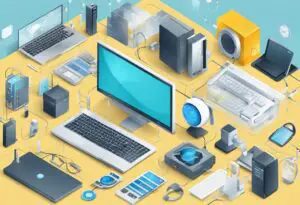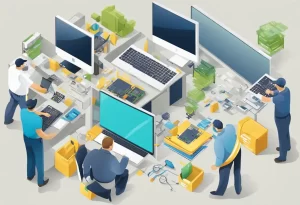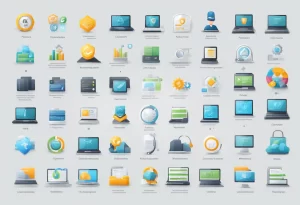Types Of IT Services You Need To Know: Expert Opinions And Insights
Expert Analysis: The Different Types Of IT Services Explained

IT services are a crucial component of modern business operations. They encompass a wide range of technical services that support the organization’s information technology infrastructure. IT services help businesses to manage their technology needs, from software and hardware management to network security and data storage. In this article, we will explore the different types of IT services and how they can benefit businesses of all sizes.
One of the most common types of IT services used in businesses is managed IT services. These services provide businesses with a dedicated team of IT experts who manage their technology infrastructure. Managed IT services can include everything from help desk support to network monitoring and security. They are designed to help businesses streamline their IT operations and reduce downtime, while also providing cost-effective solutions for managing their technology needs.
Another type of IT service is cloud-based services. These services provide businesses with access to cloud-based applications and storage solutions. Cloud-based services are becoming increasingly popular due to their scalability, flexibility, and cost-effectiveness. They allow businesses to access their data and applications from anywhere in the world, making it easier to collaborate and work remotely. In the following section, we will explore the breakdown of different types of IT services.
Key Takeaways
- IT services encompass a wide range of technical services that support the organization’s information technology infrastructure.
- Managed IT services and cloud-based services are two of the most common types of IT services used in businesses.
- Choosing the right IT services can help businesses streamline their operations, reduce downtime, and improve productivity.
Types of IT Services

There are various types of IT services that businesses can utilize to manage their daily operations. These services can range from basic support to complex infrastructure management. Here are some of the most common types of IT services:
Managed IT Services
Managed IT services are a popular choice for small businesses that require low-level IT support. This type of service is typically offered by managed service providers (MSPs) and covers basic IT needs such as software updates, network monitoring, and security management. By outsourcing IT management to a third-party provider, businesses can focus on their core operations while ensuring that their IT infrastructure is running smoothly.
Cloud-Based Services
Cloud-based services have become increasingly popular in recent years due to their flexibility and scalability. These services allow businesses to store and access data and applications over the internet, eliminating the need for local servers and hardware. Cloud-based services can include storage, backup, and disaster recovery solutions, as well as software applications and platforms.
On-Demand IT Services
On-demand IT services are designed to provide businesses with immediate IT support whenever they need it. This type of service is typically provided by IT consulting firms or freelance IT professionals. On-demand IT services can include troubleshooting, software installation, network setup, and security assessments.
IT Consultation Services
IT consultation services are designed to help businesses develop and implement IT strategies that align with their overall business goals. This type of service is typically provided by IT consulting firms and can include IT assessments, technology planning, and project management. By working with an IT consultant, businesses can ensure that their IT infrastructure is aligned with their business objectives and is optimized for maximum efficiency.
In conclusion, businesses can benefit greatly from utilizing various types of IT services. By outsourcing IT management and support to third-party providers, businesses can focus on their core operations while ensuring that their IT infrastructure is running smoothly and efficiently.
Managed IT Services Breakdown
Managed IT services are a type of outsourced IT support that can help businesses maintain and manage their IT infrastructure. These services are typically provided by a third-party vendor who is responsible for monitoring and maintaining the IT systems of their clients. Here is a breakdown of some of the most common types of managed IT services:
Network Management
Network management is a type of managed IT service that involves the remote monitoring and management of a business’s network infrastructure. This includes servers, switches, firewalls, and other critical devices. Network management services can help businesses ensure that their network is secure, reliable, and performing optimally.
Data Backup
Data backup is a critical component of any IT infrastructure. Managed IT service providers can help businesses ensure that their data is backed up regularly and securely. This can include both onsite and offsite backup solutions. Data backup services can also include disaster recovery planning and testing.
Cybersecurity Services
Cybersecurity services are designed to help businesses protect their IT infrastructure from cyber threats. This can include services such as antivirus and malware protection, intrusion detection and prevention, and vulnerability scanning. Managed IT service providers can also help businesses develop and implement cybersecurity policies and procedures to minimize the risk of a cyber attack.
In summary, managed IT services can provide businesses with a range of benefits, including improved network performance, reliable data backup, and enhanced cybersecurity. By outsourcing their IT support to a third-party vendor, businesses can focus on their core operations while leaving the management of their IT infrastructure to the experts.
Cloud-Based Services Breakdown
Cloud-based services are IT services that are delivered over the internet. These services have become increasingly popular over the years due to their flexibility, scalability, and cost-effectiveness. There are three main types of cloud-based services: Software as a Service (SaaS), Infrastructure as a Service (IaaS), and Platform as a Service (PaaS).
Software as a Service (SaaS)
SaaS is a cloud-based service that provides end-users with access to software applications over the internet. The software is hosted and managed by the service provider, which means that the end-user does not need to worry about maintenance, updates, or security. SaaS is a popular choice for businesses that want to avoid the costs and complexities of managing their own software applications. Examples of SaaS include email services like Gmail, productivity suites like Microsoft Office 365, and customer relationship management (CRM) systems like Salesforce.
Infrastructure as a Service (IaaS)
IaaS is a cloud-based service that provides businesses with access to computing resources over the internet. These resources include servers, storage, networking, and virtual machines. With IaaS, businesses can quickly and easily scale their computing resources up or down based on their needs, which makes it a popular choice for businesses with fluctuating workloads. IaaS is also a popular choice for businesses that want to avoid the costs and complexities of managing their own physical infrastructure. Examples of IaaS include Amazon Web Services (AWS), Microsoft Azure, and Google Cloud Platform.
Platform as a Service (PaaS)
PaaS is a cloud-based service that provides businesses with access to a platform for developing, testing, and deploying software applications over the internet. The platform includes tools, libraries, and frameworks that developers can use to build their applications. With PaaS, businesses can quickly and easily develop and deploy software applications without having to worry about the underlying infrastructure. PaaS is a popular choice for businesses that want to focus on building and delivering software applications rather than managing infrastructure. Examples of PaaS include Heroku, Google App Engine, and Microsoft Azure.
On-Demand IT Services Breakdown
On-demand IT services are a type of IT service that is provided to businesses on an as-needed basis. They can be used to supplement a company’s existing IT infrastructure or to provide additional support during peak periods. Here is a breakdown of the two most common types of on-demand IT services:
Hardware Repairs
Hardware repairs are a type of on-demand IT service that involves repairing or replacing a company’s computer hardware. This can include things like fixing a broken screen or replacing a faulty hard drive. Hardware repairs can be done on-site or remotely, depending on the nature of the problem.
When a company experiences a hardware failure, it can be a major disruption to their operations. On-demand hardware repair services can help minimize downtime and get the company back up and running as quickly as possible. These services are typically provided by trained technicians who have experience working with a wide variety of hardware configurations.
Software Troubleshooting
Software troubleshooting is a vital on-demand IT service that helps businesses diagnose and fix issues with software applications, such as bugs, performance problems, and compatibility issues. Technicians can provide support remotely or on-site, often using secure remote access software to resolve problems. Overall, these services are invaluable for minimizing downtime and ensuring smooth operations within a company’s IT infrastructure.
IT Consultation Services Breakdown

IT consultation services are designed to help businesses make informed decisions about their technology infrastructure. These services provide expert advice and guidance on how to optimize IT resources to meet business goals and objectives. Here is a breakdown of the different types of IT consultation services:
IT Strategy Development
IT strategy development is a key component of IT consultation services. This involves assessing the current IT infrastructure and identifying areas for improvement. The consultant will work with the business to develop a comprehensive IT strategy that aligns with business goals and objectives. This may include recommendations for hardware and software upgrades, cloud solutions, cybersecurity measures, and more.
System Integration
System integration is another important aspect of IT consultation services. This involves integrating different systems and technologies to work seamlessly together. The consultant will assess the current IT infrastructure and identify opportunities for integration to improve efficiency and productivity. This may include integrating different software applications, databases, and hardware components.
In conclusion, IT consultation services are essential for businesses that want to optimize their IT resources and achieve their goals and objectives. By working with an experienced IT consultant, businesses can develop a comprehensive IT strategy and integrate different systems and technologies to improve efficiency and productivity.
Choosing the Right IT Services

When it comes to choosing the right IT services for a business, there are a few important factors to consider. By assessing business needs and evaluating service providers, a company can make an informed decision that will help them achieve their goals and improve efficiency.
Assessing Business Needs
Before selecting an IT service provider, it’s important to assess the needs of the business. This involves identifying areas where technology can improve operations and increase productivity. Some questions to consider include:
- What are the current pain points in the business?
- What tasks are currently being performed manually that could be automated?
- What areas of the business could benefit from improved communication and collaboration tools?
- What are the long-term goals of the business, and how can technology help achieve them?
By answering these questions, a business can identify the specific IT services that will provide the most value and impact.
Evaluating Service Providers
Once business needs have been identified, it’s important to evaluate potential service providers. Some factors to consider include:
- Experience and expertise: Does the service provider have experience working with businesses in the same industry? Do they have expertise in the specific IT services that are needed?
- Service offerings: Does the service provider offer the specific IT services that are needed? Are they able to provide customized solutions that meet the unique needs of the business?
- Support and communication: How responsive is the service provider to inquiries and issues? Do they offer 24/7 support? Is there a dedicated account manager or point of contact?
- Pricing and contracts: What is the pricing structure for the services? Are there any hidden fees? What is the length of the contract, and are there any cancellation fees?
By evaluating these factors, a business can choose an IT service provider that is the right fit for their needs and budget.
Frequently Asked Questions
What are some common IT services offered to businesses?
There are many IT services that businesses can use to improve their operations and increase productivity. Some of the most common IT services include cloud services, hardware and software support services, cybersecurity solutions, network security and management services, email services, and IT communications services. These services can help businesses store and access information, protect their systems from cyber threats, and communicate effectively with their teams.
What are the different types of software services in IT?
There are many different types of software services in IT, including software development, software testing, software maintenance, and software consulting. Software development involves creating new software applications, while software testing ensures that the software is working correctly. Software maintenance involves updating and maintaining existing software, and software consulting provides expert advice and guidance on software-related issues.
What distinguishes IT services from IT support?
While IT services and IT support are often used interchangeably, there are some key differences between the two. IT services refer to the range of services that businesses can use to improve their operations and increase productivity, such as cloud services, cybersecurity solutions, and IT communications services. IT support, on the other hand, refers to the assistance provided to users who are experiencing technical issues with their systems or software.
What are some examples of information technology?
Information technology (IT) refers to the use of computer systems and software to store, retrieve, and transmit information. Some examples of information technology include computers, smartphones, tablets, servers, databases, and software applications.
What are the top 10 types of IT services?
The top 10 types of IT services vary depending on the needs of the business, but some of the most common include cloud services, cybersecurity solutions, hardware and software support services, network security and management services, email services, IT communications services, data backup and recovery services, software development services, IT consulting services, and virtualization services.
What are the different types of IT support systems?
There are several different types of IT support systems, including help desk support, network support, software support, and hardware support. Help desk support provides assistance to users who are experiencing technical issues with their systems or software, while network support focuses on maintaining and managing a company’s network infrastructure. Software support involves providing assistance with software-related issues, and hardware support provides assistance with hardware-related issues.
Conclusion
In conclusion, there are many different types of IT services that businesses can utilize to improve their operations and protect their data. Cloud services are becoming increasingly popular due to their flexibility and scalability, allowing businesses to access information and programs from anywhere with an internet connection. Hardware and software support services are also essential for maintaining and troubleshooting technology issues.
Cybersecurity solutions are crucial for protecting sensitive data from cyber threats, while IT communications services help businesses stay connected and collaborate effectively. Network security and management services are essential for maintaining a secure and reliable network infrastructure. Email services are also important for communication and productivity.
Managed IT services are a comprehensive option for businesses looking to outsource their IT needs, including remote server, desktop, and device management, as well as remote cybersecurity and cloud backup services. Low-level managed IT services are a good option for small businesses looking for basic IT support.
Overall, businesses should carefully consider their specific IT needs and goals when choosing which types of IT services to utilize. By working with a trusted IT service provider, businesses can ensure that their technology is running smoothly and securely, allowing them to focus on their core operations.

I am a technology Specialized writer and blogger based in the USA & UK. I have four years of experience in Cyber Security, Technology, Social Media and all types of electronic devices like computer laptops etc. So I work on solving these issues and give various tips on these issues



